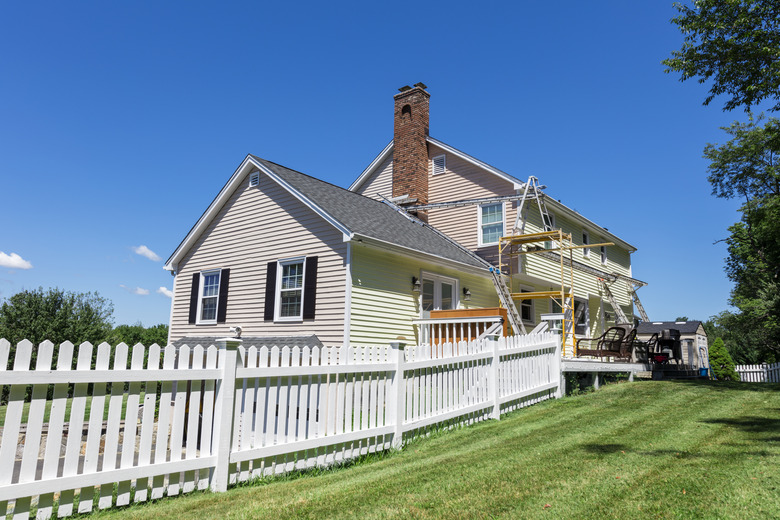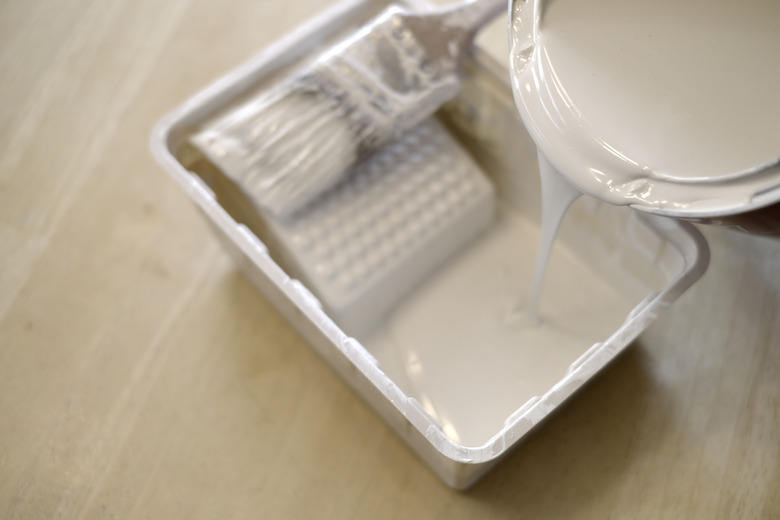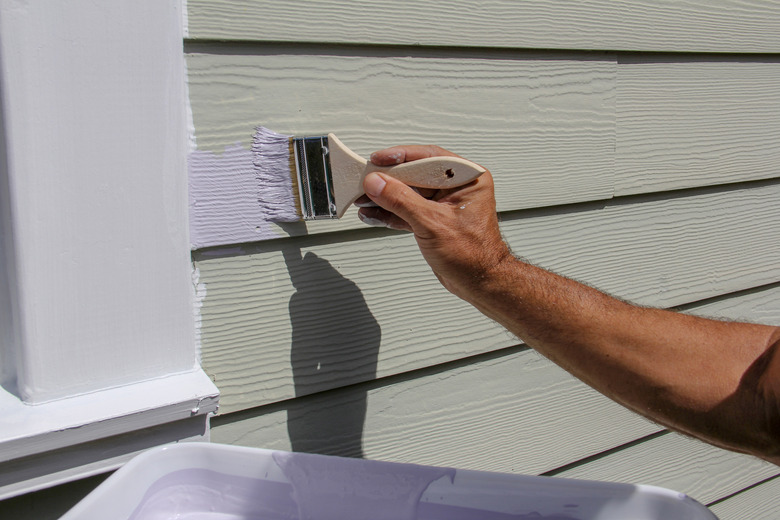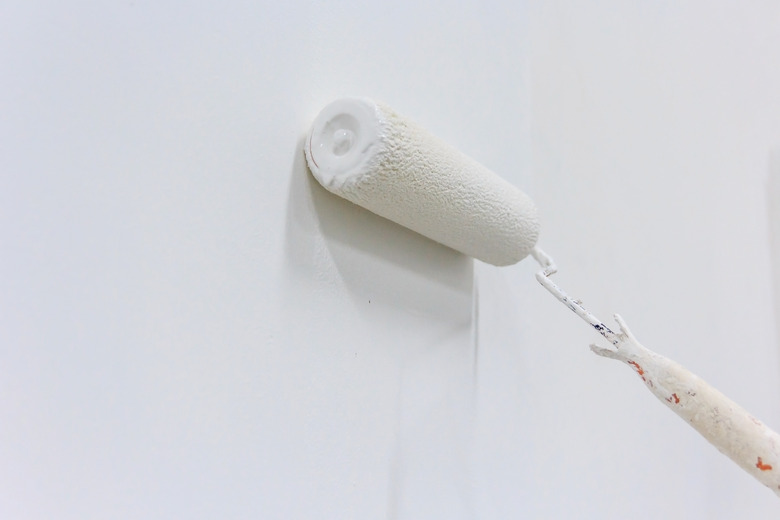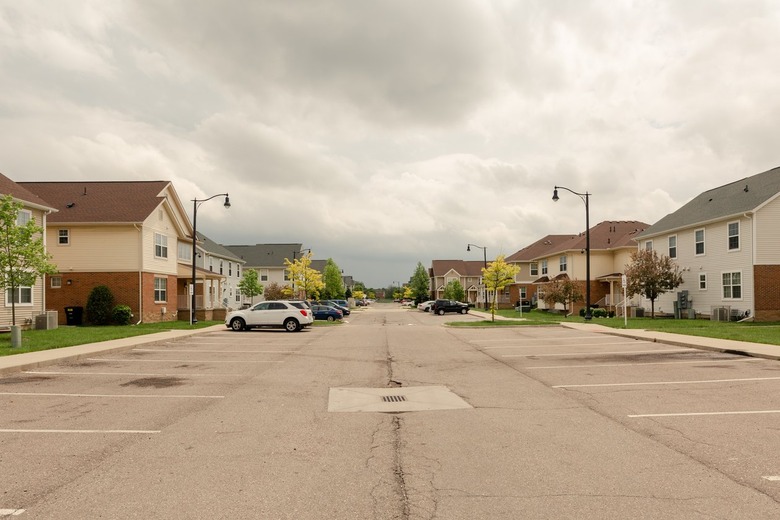How To Hire For An Exterior Paint Job: 10 Questions To Ask
Of all the home improvement projects homeowners can tackle to upgrade their home's curb appeal and make it more inviting, an exterior paint job is the most effective. It isn't necessarily the easiest or least expensive because exterior house painting is challenging — even more so than interior painting. Exterior painting isn't impossible, though, and there are plenty of house painting companies eager to do the work for you (for a fee). But beware — some painters may lack the experience and skills necessary to guarantee a professional paint job.
There are many things to manage besides getting the actual paint on the walls, including doing prep work, erecting scaffolding, protecting the landscape from paint spray, and ensuring the paint goes on the walls and not on doors and windows. Because there is so much to do, painting contractors usually employ crews of several people to ensure your project can be completed within a reasonable timeline. These employees are the people who will do the actual work, and you probably won't get to meet any of them until they show up on day one. That's why it's in your best interest to ask the representative you work with some important questions before you sign anything.
The best time to get clear about the details of the work to be done is before you accept the cost estimate and hire them. If you simply let the company representative do an inspection and provide an estimate without your input, you could be setting yourself up for disappointment, and you could even be unintentionally incurring liability. By asking the following questions, you're likely to avoid both of these negative outcomes.
1. Are You Licensed, Bonded, and Insured?
1. Are You Licensed, Bonded, and Insured?
Not all states require contractors to be licensed, and painting contractors are regulated less stringently than plumbers, electricians, or building contractors. Painting contractors may be required merely to register with the state to bid for jobs exceeding a certain sum. So, failure to hold a license doesn't automatically disqualify a contractor from doing your job, but it's definitely still important.
Licensed contractors typically carry liability insurance, which protects them (and you) from damage incurred to your property during the course of the job. If someone accidentally knocks a can of paint into the swimming pool, for example, the contractor's liability insurance would pay for the cleanup.
Licensed contractors are also usually bonded, which provides assurance against defects in workmanship. If they have a crew, contractors should also carry workers' compensation insurance, which protects them (and you) against injuries suffered by workers on your property.
Hiring an unlicensed contractor without bonding and insurance could put you on the hook if an accident happens, and it might leave you with no recourse in the event of unprofessional workmanship.
2. What Is the Best Paint for This Job?
2. What Is the Best Paint for This Job?
Part of the job of a painting company is to guide you in choosing the right paint, and while that service may or may not include a paint color consultation, it definitely involves selecting an appropriate paint quality. Paint quality affects the price of the job, and you may be happy to save a few bucks by opting for a generic product. However, if you want the paint to last longer, you shouldn't mind paying extra for high-quality paint.
Painters who limit your choices to a particular brand might be getting a discount on that brand. There's nothing unethical about that, but an experienced contractor knows the differences among brands, and one who is on your team should be able to guide you to a different brand if appropriate. The issue of paint quality also includes the quality of primer and caulk used for the job.
3. How Long Do You Expect the Job to Take?
3. How Long Do You Expect the Job to Take?
You can learn a lot from this question, especially if the paint job is a big one. A vague answer ("about two weeks") could indicate someone without much experience or who doesn't work closely with the crew. An answer that sounds too optimistic ("we'll be in and out in three days") usually foreshadows poor-quality workmanship. A realistic answer ("if everything goes smoothly, about a week, but ... ") gives you a definite time frame but one with enough flexibility to allow for bad weather and other unforeseen circumstances.
4. Are Your Crew Members Employees or Subcontractors?
4. Are Your Crew Members Employees or Subcontractors?
Employees work by the hour, so it's worth it to them to take the time to do the job right. Subcontractors work for a fixed fee and are more likely to cut corners, with the result being an inferior job overall. Moreover, the contractor may not even have worked with them before and may be unable to guarantee their work. Finally, subcontractors usually don't carry workers' compensation insurance.
5. Who's Going to Manage the Paint Job?
5. Who's Going to Manage the Paint Job?
The person who comes to your house to give you an estimate may only be a representative from the paint services provider and may not even be a house painter. If that's true, you should know that up front. Ask to meet the foreman of the crew. It could take a week or more to paint the exterior of your house, and you need to get a feel for the person coordinating affairs on your property for that length of time before you sign anything.
6. What is Your Painting Process?
6. What is Your Painting Process?
This question focuses on the details of the job and includes a number of related questions:
- How much prep work, including scraping, sanding, and patching holes, will be involved?
- Is priming required, and if so, will it be spot priming or will primer be applied to the whole building?
- Will you work from ladders or will you need to erect scaffolding? Scaffolding is a temporary structure installed on the outside of your house to support painters while they work.
- It's going to take more than one coat of paint for a quality makeover, obviously, but how many: two or three?
- Will the workers spray the paint or apply it by brush and roller? If spraying, what's the procedure for masking off doors and windows?
- Does the price include new caulk around doors and windows?
7. Can You Handle Lead Paint?
7. Can You Handle Lead Paint?
If your house predates 1978, there's a good chance that it has at least one coat of lead-based paint on the exterior. Lead is toxic and an environmental hazard, and any chips of lead paint that get scraped off and settle in the grass could be ingested by children or pets, leading to serious health consequences.
Before starting the painting project, the contractor should agree to test for lead paint. If the test is positive, the crew needs to take steps to gather all the paint chips and dispose of them appropriately, following local regulations. This is time-consuming and will affect the painting cost, and some contractors aren't equipped to do it, so it's something that needs to be discussed before the job starts.
8. How Will You Protect the Landscape?
8. How Will You Protect the Landscape?
The paint crew needs to protect bushes, flower gardens, walkways, patios, and other landscape features from overspray, paint chips, and paint splatters. Heavy canvas drop cloths could harm delicate plants, though, so ask how the crew will provide the needed protection.
9. Do You Work in Inclement Weather?
9. Do You Work in Inclement Weather?
No home painting service will work when it's raining, of course, but what about if it's windy? High winds spread overspray far and wide and force the crew to use more paint. Working in excessive heat and sun is also bad practice because heat causes new paint to dry too quickly and crack. In very cold weather, paint dries slowly and has a tendency to run and drip. Find out what the contractor's policy is concerning adverse weather conditions.
10. Do You Guarantee Your Work?
10. Do You Guarantee Your Work?
A reputable paint company will provide some kind of warranty against peeling, chipping and other defects caused by substandard materials or poor workmanship. A typical warranty for wood siding is five to seven years, while for stucco, it's a little longer — as much as 10 years.
